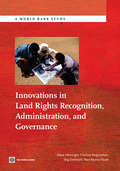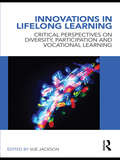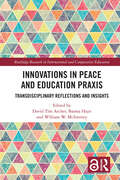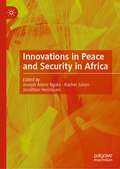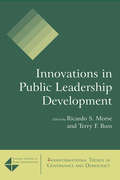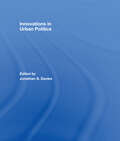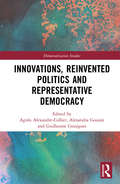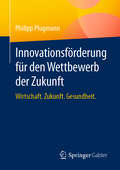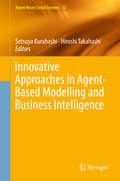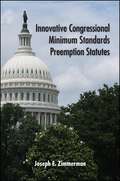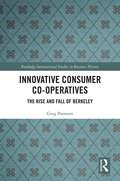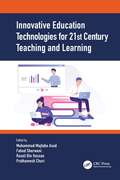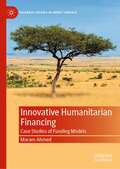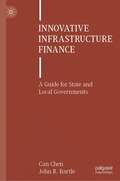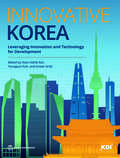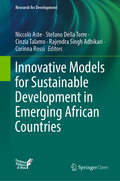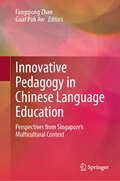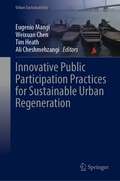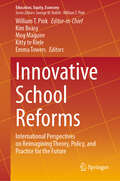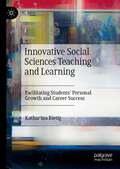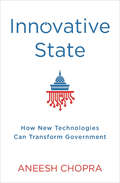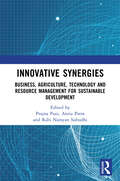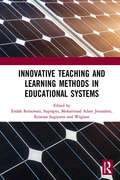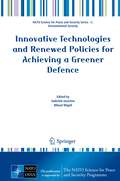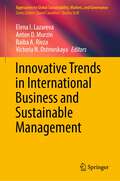- Table View
- List View
Innovations in Land Rights Recognition, Administration, and Governance
by Paul Munro-Faure Clarissa Augustinus Stig Enemark Klaus DeiningerThe importance of good land governance to strengthen women's land rights, facilitate land-related investment, transfer land to better uses, use it as collateral, and allow effective decentralization through collection of property taxes has long been recognized. The challenges posed by recent global developments, especially urbanization, increased and more volatile food prices, and climate change have raised the profile of land and the need for countries to have appropriate land policies. However, efforts to improve country-level land governance are often frustrated by technical complexities, institutional fragmentation, vested interests, and lack of a shared vision on how to move towards good land governance and measure progress in concrete settings. Recent initiatives have recognized the important challenges this raises and the need for partners to act in a collaborative and coordinated fashion to address them. The breadth and depth of the papers included in this volume, all of which were presented at the World Bank's Annual Conference on Land Policy and Administration, illustrate the benefits from such collaboration. They are indicative not only of the diversity of issues related to land governance but, more importantly, highlight that, even though the topic is complex and politically challenging, there is a wealth of promising new approaches to improving land governance through innovative technologies, country-wide policy dialogue, and legal and administrative reforms. The publication is based on an on-going partnership between the World Bank, the International Federation of Surveyors, the Global Land Tool Network and the United Nations Food and Agriculture Organization provide tools that can help to address land governance in practice and at scale. It is our hope that this volume will be of use to increase awareness of and support to the successful implementation of innovative approaches that can help to not only improve land governance, but also thereby contribute to the well-being of the poorest and the achievement of the Millennium Development Goals.
Innovations in Lifelong Learning: Critical Perspectives on Diversity, Participation and Vocational Learning
by Sue JacksonThis book opens up ways to engage critically with what counts as innovatory practice in lifelong learning today, locating its discussion of innovations in lifelong learning within an international and comparative framework. Innovations in Lifelong Learning engages first hand with issues and concerns from around the globe, offering an international perspective on current trends through its range of contributions from across the UK, Australia, New Zealand and the US. The broad focus allows for diverse information on the nature of these changes to come together under an assortment of empirical, theoretical and methodological approaches. The book takes three key elements of lifelong learning: learning communities participation and non-participation work-based learning and learning through work. It links these with themes on diversity, social justice and economic and global development so as to negotiate and re-negotiate the constant importance of innovation with employers, learners and educational institutions. All those working in the broad arena of lifelong learning will benefit from this comprehensive examination of current debates in the field, including policy-makers, researchers, teachers, lecturers, educational managers and employers engaged with work-based learning.
Innovations in Peace and Education Praxis: Transdisciplinary Reflections and Insights (Routledge Research in International and Comparative Education)
by David Tim Archer Basma Hajir William W. McInerneyThis edited collection brings together a series of conceptual explorations and practical case studies to illuminate a developing innovative praxis of transdisciplinary peace and education. Drawing on the work of the Cambridge Peace and Education Research Group as well as international scholars, this book responds to calls for transdisciplinary peace and education praxis and presents innovative examples of peace and education research practices, peace interventions in educational settings, and alternative ontologies in peace and education work. Foregrounding the concept of ‘second-order reflexivity’, the book prioritises the lived experiences and viewpoints of struggling populations regarding the worth of ‘peace’ as grounded within their contexts. Ultimately, this book showcases how the practices of peace education and research can challenge the binaries of modern and postmodern approaches and provide examples of holistic transdisciplinary approaches that embrace complexity and criticality. Contributing new knowledge to peace and education, this volume will be of great interest to academics, post-graduate students and researchers in the field of peace education, peace studies and development studies.
Innovations in Peace and Security in Africa
by Joseph Adero Ngala Rachel Julian Jonathan HenriquesThis edited volume harnesses African expertise to examine the local and global dimensions of peace. It is an outcome of a workshop in Nairobi, Kenya that convened African academics and practitioners with diverse specialisations. The authors’ contributions foreground local voices across a broad scope of inquiry, including rural community structures, health, trauma, sexual violence, peacekeeping and cybersecurity. African knowledge is essential to understanding peace on the continent – the complexities of conflict and insecurity, the lived experiences of individuals and communities, and their responses to such phenomena. This analytical approach underpins the book, creating fertile ground to identify and develop innovations that hold the promise for sustainable African solutions.
Innovations in Public Leadership Development (Transformational Trends In Governance And Democracy Ser.)
by Terry F. Buss Ricardo S. MorseThis is the best single-source guide to leadership development in the public sector. It offers a wealth of advice for teachers, students, trainers, human resource officers, and established leaders. The all-original chapters include discussions of leadership frameworks, competencies for public leaders for the "new governance," and strategies for senior leaders in government.The book's wide-ranging coverage includes in-depth discussions of specific approaches to learning methods such as action learning and social artistry, as well as presentations of leader development models such as transformational stewardship and global leadership. The contributors present experiences from real-world leadership development programs, and the book situates leader development within the current trends of networks, collaboration, and boundary-crossing work in the public sector.
Innovations in Urban Politics
by Jonathan S. DaviesPreviously published as a special issue of Policy Studies, this volume demonstrates the vitality of the field of urban politics and presents future challenges for urban political research in the years ahead.If it does not already, the population of cities will very soon make up more than half the global population. As the global urban population co
Innovations, Reinvented Politics and Representative Democracy (Democratization Studies)
by Agnès Alexandre-Collier Alexandra Goujon Guillaume GourguesThis volume focuses on the issue of change in democratic politics in terms of experimental or actual innovations introduced either within political parties or outside the party system, involving citizen participation and mobilization. Including a wide and diverse range of alternatives in the organization of groups, campaigning, conducting initiatives and enhancing practices, they not only question the relevance of traditional institutions in representing citizens’ values and interests, but also share a common goal which is precisely – and perhaps paradoxically – to reshape and invigorate representative democracy This book is of key interest to scholars and students of party politics, elections/electoral studies, social movement and democratic innovations and more broadly to comparative politics, political theory and political sociology.
Innovationsförderung für den Wettbewerb der Zukunft: Wirtschaft. Zukunft. Gesundheit.
by Philipp PlugmannEuropa steht aktuell vor mannigfaltigen Herausforderung. Handelskrieg, Massenentlassungen, Jugendarbeitslosigkeit und eine immer älter werdende Gesellschaft sind nur einige der Probleme, mit denen wir in Zukunft zu kämpfen haben. Gleichzeitig ringen etablierte Unternehmen und Start-Ups im globalen Wettbewerb um die Aufmerksamkeit der Kunden. Das digitale Zeitalter fordert sie zur Entwicklung neuer Produkte und Dienstleistungen. Die Wettbewerbsrahmenbedingungen haben sich verändert, neue Geschäftsmodelle und Unternehmensstrukturen müssen her. Gerade jetzt spielt Innovationsförderung daher eine wichtige Rolle. Um auch in Zukunft wettbewerbsfähig zu bleiben, müssen Unternehmer neue Perspektiven fördern und in die nötigen Maßnahmen zur Umsetzung investieren.Dieses Buch stellt einige der wichtigsten Wettbewerber vor und regt zu einer nachhaltigen wirtschaftspolitischen Innovationsförderung an. Es richtet sich vorrangig an Menschen, die Unternehmen gründen, aufbauen oder bestehende Firmen transformieren wollen. Dabei bietet es eine Mischung aus wissenschaftlichen Perspektiven, anwendungsorientierten praktischen Überlegungen und persönlichen Erfahrungen in akademischen und privatwirtschaftlichen Innovationsumgebungen in zahlreichen Ländern.
Innovative Approaches in Agent-Based Modelling and Business Intelligence (Agent-Based Social Systems #12)
by Setsuya Kurahashi Hiroshi TakahashiThis book thoroughly prepares intermediate-level readers for research in social science, organization studies, economics, finance, marketing science, and business science as complex adaptive systems. It presents the advantages of social simulation studies and business intelligence to those who are not familiar with the computational research approach, and offers experienced modelers various instructive examples of using agent-based modeling and business intelligence approaches to inspire their own work. In addition, the book discusses cutting-edge techniques for complex adaptive systems using their applications.To date, business science studies have focused only on data science and analyses of business problems. However, using these studies to enhance the capabilities of conventional techniques in the fields has not been investigated adequately. This book addresses managing the issues of societies, firms, and organizations to profit from interaction with agent-based modeling, human- and computer- mixed systems, and business intelligence approaches, an area that is fundamental for complex but bounded rational business environments.With detailed research by leading authors in the field, Innovative Approaches in Agent-Based Modelling and Business Intelligence inspires readers to join with other disciplines and extend the scope of the book with their own unique contributions. It also includes the common challenges encountered in computational social science and business science to enable researchers, students, and professionals to resolve their own problems.
Innovative Congressional Minimum Standards Preemption Statutes
by Joseph F. ZimmermanCongress possesses broad regulatory powers, including the power of complete or partial preemption of state and local regulatory powers. Congress rarely enacted preemption statutes before the twentieth century, but since the 1960s such interventions have grown significantly in number, now totaling over seven hundred, and have transformed the nature of the American federal system. In Innovative Congressional Minimum Standards Preemption Statutes, Joseph F. Zimmerman provides the background and history of this critical transformation, classifying the forms these federal interventions have taken, with a focus on statutes dealing with such environmental issues as water and air quality, restoration of surface-mined areas, and still other areas that, collectively, have produced a revolution in relations between Congress and the states. Contrary to public perceptions of preemption being one-sided and heavy-handed, Zimmerman details the many variations present in these statutes that accommodate state and local interests, allowing for administrative and policy flexibility, and a generally cooperative relationship between states and localities and federal administrative agencies.
Innovative Consumer Co-operatives: The Rise and Fall of Berkeley (Routledge International Studies in Business History)
by Greg PatmoreConsumer co-operatives provide a different approach to organizing business through their ideals of member ownership and democratic practice. Every co-operative member has an equal vote regardless of his or her own personal capital investment. The co-operative movement can also be an important force in promoting development and self-sufficiency in poorer areas, particularly in non-industrialised countries. This book explores in depth the fortunes of the Berkeley Consumer Co-operative, which became the largest consumer co-operative in the United States with 116,000 members in 1984 and viewed nationally as a leader in innovative retail practices and a champion of consumer rights. The Berkeley Consumer Co-operative is promoted by both supporters and opponents of the co-operative business model as a significant example of what can go wrong with the co-operatives. This book will provide the first in depth analysis of the history of the Berkeley Co-operative using its substantial but little used archives and oral histories to explore what the Berkeley experience means for the co-operative business model. The specific chapters relating to Berkeley will be organised around particular themes to highlight the issues relating to the co-operative business model and the local context of Berkeley. The themes relate to developments in Berkeley and the Bay Area in terms of the economy, politics and the retail environment; the management of the Berkeley co-operative, looking at governance, financial management and strategic decisions; relationship of management with members and employees; and finally, the relationship of the Berkeley Co-operative with the community. The core message of the book is that it is not inevitable that consumer co-operatives fail, but that the story of Berkeley story can provide insights that can strengthen the co-operative business model and minimise failures on the scale of Berkeley occurring in the future.
Innovative Education Technologies for 21st Century Teaching and Learning
by Muhammad Mujtaba AsadThis book highlights all aspects of innovative 21st-century education technologies and skills which can enhance the teaching and learning process on a broader spectrum, based on best practices around the globe. It offers case studies on real problems involving higher education, it includes policies that need to be adaptable to the new environments such as the role of accreditation, online learning, MOOCs, and mobile-based learning. The book covers all aspects of the digital competencies of teachers to fulfill the required needs of 21st-century classrooms and uses a new pedagogical approach suitable for educational policies. Innovative Education Technologies for 21st Teaching and Learning is the first book that addresses the teaching and learning challenges and how those challenges can be mitigated by technology which educational institutions are facing due to the COVID-19 pandemic. This book is suitable for teachers, students, instructional and course designers, policymakers, and anyone interested in 21st-century education.
Innovative Humanitarian Financing: Case Studies of Funding Models (Palgrave Studies in Impact Finance)
by Maram AhmedHumanitarian crises have become more frequent, complex and protracted. If current trends continue, it is estimated that by 2030, humanitarian assistance costs could increase to $50 billion per year. By then, two-thirds of the world’s poor are at risk of living in conflict-affected countries. To bridge the gap, humanitarian organizations are increasingly utilizing innovative financing tools such as impact bonds, faith-based finance and other innovative financial products and services to mobilize greater funding to address humanitarian needs. This book is among the first to assess a set of innovative financing mechanisms that have been transforming the humanitarian sector and explores their key opportunities, challenges and future prospects. This book will be of interest to academics, practitioners, humanitarian organizations and policy makers involved in humanitarian financing and to the humanitarian sector in general.
Innovative Infrastructure Finance: A Guide for State and Local Governments
by Can Chen John R. BartleInfrastructure is the foundation of modern economies. A robust, efficient, and well-maintained infrastructure system is critical to support the nation’s economy, improve quality of life, and strengthen global competitiveness. The serious infrastructure deficit in the U.S. is well-known. State and local governments are struggling to finance the needed expansion, upgrades, and repairs. Meeting the infrastructure financing challenge has emerged as one of the most urgent issues facing the country. Despite the growing number of innovations in state and local infrastructure financing, current information on innovative infrastructure financing is scattered and time-consuming to find. Until now, there was no detailed, comprehensive assessment of current knowledge and practice in innovative infrastructure financing. This book fills that gap and offers policy suggestions for state and local government managers who are considering the adoption and implementation of innovative infrastructure financing. It provides detailed case studies and rich examples that describe innovative approaches to fund state and local infrastructure development. These experiences and lessons in applying these innovations will be particularly useful for state and local government practitioners, professors, applied policy analysts, and students in public administration, policy, and public finance.
Innovative Korea: Leveraging Innovation and Technology for Development
by Anwar Aridi Hoon Sahib Soh Youngsun KohThe Republic of Korea today is a highly industrialized, global leader in innovation and technology. It is the 10th largest economy in the world and has a per capita income approaching the average of OECD countries. In the 1950s, however, it was one of the world’s poorest countries, with decidedly bleak prospects. Its transformation has made Korea a well-known case study of successful development. Innovative Korea: Leveraging Innovation and Technology for Development summarizes the sources of Korea’s remarkable growth and the policies and institutional reforms that made it possible. The report focuses on Korea’s successful transition from a middle-income to a high-income economy. Korea escaped from the “middle-income trap†? by fundamentally transforming its growth paradigm to a more private-sector-led model emphasizing market competition, innovation, and technology. Compared to the previous emphasis on large fi rms and industries, the government became more focused on promoting small and medium enterprises and technology entrepreneurs. Exports expanded significantly through greater integration in global value chains. Already-high levels of human capital development were complemented by an expanded social safety net and a more integrated approach to education and training. Korea succeeded by focusing on the foundations of long-run growth, building global capabilities in innovation and technology, and adapting and evolving its growth paradigm to promote new sources of growth. Innovative Korea, jointly prepared by the World Bank and the Korea Development Institute, provides useful insights on Korea’s development story and practical lessons for public policy making.
Innovative Models for Sustainable Development in Emerging African Countries (Research for Development)
by Corinna Rossi Cinzia Talamo Stefano Della Torre Niccolò Aste Rajendra Singh AdhikariThis open access book explores key issues and presents recent case studies in areas of importance for the transition to a circular model of development in emerging African countries that will minimize resource consumption and waste production. The topics covered include the development of sustainable housing models, energy and environmental issues in building design and technical systems, recycling for a sustainable future, models for humanitarian emergencies, and low-cost and web-based digital tools with applications in architecture and archaeology. The aim is to contribute to a necessary paradigm shift with respect to urban planning and usage of territories, moving from a linear urban metabolism based on the “take, make, dispose” approach to a circular metabolism. Such a change requires a focus on the relationship between the architectural, urban, and physical aspects of new developments, climate, and energy demand, as well as the identification and integration of strategies and infrastructures to achieve a high level of efficiency and self-sufficiency. The book will appeal to all with an interest in sustainable development in the African context.
Innovative Pedagogy in Chinese Language Education: Perspectives from Singapore’s Multicultural Context
by Fangqiong Zhan Guat Poh AwThis book reflects on the Chinese education context in Singapore, addressing the challenges of the Chinese language education system, exploring innovative and efficient language teaching approaches and proposing new directions for Chinese education in Singapore. It explores Chinese education in the Singapore bilingual context in terms of language policy, sociolinguistics, cultural integration and pedagogical practice, as well as providing a blueprint of Singapore&’s Chinese education for the future. It presents chapters from Singaporean scholars who are mostly from the department of Asian Language and Culture and the Office of Education Research in the National Institute of Education at Nanyang Technological University. This book examines the following topics: the sociolinguistic landscape beyond China and the positioning of Chinese in Singapore; pedagogical practices and methodologies in Singapore&’s bilingual education context; and Chinese textbooks and teaching materials in Singapore. This book serves as a useful reference for readers interested in language policy and Chinese education internationally, for educators who encounter similar challenges in language education, and for policy makers who aim to fine tune current policies to be more comprehensive and effective.
Innovative Public Participation Practices for Sustainable Urban Regeneration (Urban Sustainability)
by Ali Cheshmehzangi Tim Heath Eugenio Mangi Weixuan ChenThis book analyzes the adoption of stakeholders’ engagement in various fields and scales while providing the readers with an international outlook of the topic. In the contemporary processes of urban development, regeneration is becoming a relevant way to limit the occupation of new land and to enhance the existing spatial, social, and ecological dimensions of specific parts of the city. It generally entails the engagement of different groups of stakeholders and users at various levels—e.g., institutional and private—who carry on their own agendas while conveying a wide range of interests and values to safeguard. At the same time, despite indications of a significant increase in its implementation under various forms and in multiple contexts in the last twenty years, participatory mechanisms have not been without challenges and barriers due to several factors, including facilitators’ poor negotiation and communication practices, and consequently misinterpretation of the values at stake made by the parties involved, or obstructionism and gridlocks carried on by the different stakeholders. The narrative of the collection is structured in four sections The contributions elaborate on innovative participatory patterns, how they are/might be entangled with the different stages of regeneration projects, in what measure they have contributed to the United Nations sustainability goals, and the potential matters emerging during the negotiation phases. In detail, the four sections are: 1. Public space regeneration 2. Ecological regeneration 3. Built heritage regeneration 4. Informal settlements regeneration. Finally, this book is a significant asset to urban policy makers, planners, practitioners, and researchers in the architecture and urban studies domain who aim at deepening public participation practices knowledge by comparing different experiences.
Innovative School Reforms: International Perspectives on Reimagining Theory, Policy, and Practice for the Future (Education, Equity, Economy #11)
by William T. PinkThis book is a curated collection of international chapters focused on the reform of K-12 schools. Three key, yet different cultural, economic, and political settings are highlighted: Australia, the UK, and the US. Within their own context, each author details the required reforms that would maximize learning for all students. The intersectionalities of factors such a race, gender, class, ethnicity, disability, language, and economic inequities, are interrogated for their impact on the efficacy of reform strategies. Authors explore both a range of dysfunctional factors which have historically limited the efficacy of school reform initiatives, and detail a variety of forward-looking and cutting edge alternative reforms. Thus, this text can serve to stimulate a much need dialogue about the reconceptualization of schools in the future. Moreover, the cross-cultural analysis can focus this dialogue on both the similarities and differences in varying cultural settings.
Innovative Social Sciences Teaching and Learning: Facilitating Students' Personal Growth and Career Success
by Katharina RietigThis book offers novel insights into how students can develop a personal growth mindset during their degree programs that allows them to view new challenges as opportunity to grow personally, reflect on the new knowledge and experience, and subsequently improve their skills to critically examine and evaluate information in a journey of personal growth. Based on learning theories drawn from cognitive and social psychology and over 12 years of integrating the ‘personal growth mindset’ into course design, it offers a novel framework that allows higher education teachers to constructively align learning objectives and assessments with crucial transferable skill development, and fostering a mindset for personal growth among students that focuses on continuously improving and reflecting on feedback. The objective is to empower academics to build courses and degree programs that are ‘fit for purpose’ by equipping social science students with the skills and mindsets that will benefit them throughout their careers in ever changing and newly emerging jobs. The book will appeal to those who are interested in how individuals learn in educational settings and in the wider workplace.
Innovative State: How New Technologies Can Transform Government
by Aneesh ChopraOver the last twenty years, our economy and our society, from how we shop and pay our bills to how we communicate, have been completely revolutionized by technology. As Aneesh Chopra shows in Innovative State, once it became clear how much this would change America, a movement arose around the idea that these same technologies could reshape and improve government. But the idea languished, and while the private sector innovated, our government stalled, trapped in a model designed for the America of the 1930s and 1960s.The election of Barack Obama offered a new opportunity. In 2009, Aneesh Chopra was named the first Chief Technology Officer of the United States federal government. Previously the Secretary of Technology for Virginia and managing director for a health care think tank, Chopra was tasked with leading the administration’s initiatives for a more open, tech-savvy government.Inspired by private sector trailblazers, Chopra wrote the playbook for governmental open innovation. In Innovative State he offers an absorbing look at how open government can establish a new paradigm for the internet era and allow us to tackle our most challenging problems, from economic development to affordable health care.
Innovative Synergies: Business, Agriculture, Technology and Resource Management for Sustainable Development
by Rabi Narayan Subudhi Prajna Pani Anita PatraThe conference on “Innovative Synergies: Business, Agriculture, Technology and Resource Management for Sustainable Development (CVBSG2024)” is designed to drive sustainable development across various sectors. It aims to ensure inclusive economic growth that benefits all sections of society, emphasizing technological advancements to foster sector-wise development and innovation. The conference will deliberate on promoting entrepreneurship and developing world-class infrastructure to support sustainable growth, development and improve living standards. It targets business leaders and entrepreneurs, agricultural scientists and farmers, NGOs, technology developers and researchers, faculty and students, industry experts, policymakers and government officials who are interested in sustainable development and innovation.The various conferences on Viksit Bharat have focused on initiatives and implementation of Viksit Bharat@2047, role of media and communication, future roadmap of the financial services sectors for a Viksit Bharat, understanding various aspects of Bharat as a global leader, pioneering and transformation, dialogue and collaboration among the nation’s intellectuals. CVBSG2024 differentiates itself by uniquely integrating diverse sectors for sustainable development such as management, agriculture, agri-tech, engineering, livestock and allied sciences. It also aligns with the broader vision of “Viksit Bharat,” driving India towards self-reliance and progress by 2047.
Innovative Teaching and Learning Methods in Educational Systems: Proceedings of the International Conference on Teacher Education and Professional Development (INCOTEPD 2018), October 28, 2018, Yogyakarta, Indonesia
by Kristian Sugiyarto Suprapto Endah Retnowati Jerusalem Mohammad Adam WagironThis proceedings volume of InCoTEPD 2018 covers many ideas for handling a wide variety of challenging issues in the field of education. The outstanding ideas dealing with these issues result in innovation of the system. There are many innovation strategies resulting from recent research that are discussed in this book. These strategies will become the best starting points to solve current and future problems.This book provides an in-depth coverage of educational innovation developments with an emphasis on educational systems, formal or informal education strategies, learning models, and professional teachers. Indeed, those developments are very important to be explored for obtaining the right way of problem-solving.Providing many ideas from the theoretical foundation into the practice, this book is versatile and well organized for an appropriate audience in the field of education. It is an extremely useful reference for students, teachers, professors, practitioners, and government representatives in many countries.
Innovative Technologies and Renewed Policies for Achieving a Greener Defence (NATO Science for Peace and Security Series C: Environmental Security)
by Mikael Wigell Gabriele IacovinoThis book presents a fresh and original contribution to the debate on the policies and technologies needed to achieve a Greener Defence. It will provide an overall and comprehensive analysis of the current state and future prospects of the public and private discourse on the matter, by leveraging on four different and complementary perspectives: the national experiences of relevant NATO Member States and Partner Countries, the institutional framework of International Organizations, the role of industry and private companies and the intellectual contribution of research centers and academia. It will provide new policy recommendations and advanced and innovative technological solutions to be implemented in order to reduce the environmental footprint of Armed Forces, while improving at the same time the energy efficiency and strengthening the operational capabilities of Militaries. The book is addressed to all those interested in studying the connections between climate change, environmental issues, energy security and the role of Armed Forces, the latter seen as an important actor for reducing the environmental impact of human activities and as a forum where to discuss and implement new green technological solutions and applications.
Innovative Trends in International Business and Sustainable Management (Approaches to Global Sustainability, Markets, and Governance)
by Victoria N. Ostrovskaya Elena I. Lazareva Anton D. Murzin Baiba A. RivzaThis book describes the current innovative tendencies characteristic of multifaceted scientific research and practical developments in the field of international business development and sustainable management. This book shows how companies are forced to change development strategies and business models, which actualizes new priorities for scientific research in the field of international business and sustainable management. Therefore, completely new subject areas of research are being formed; management guidelines are being transformed; new business development tools are being developed; the very system of academic research is changing. This book “Innovative Trends in International Business and Sustainable Management” is devoted to the discussion of these and other issues related to all major areas of international business development and sustainable management. This book systematically describes multidimensional trends, challenges, and opportunities for the development of international business and sustainable management in the context of a global pandemic. In this sense, it is unique and relevant for both scientific researchers and modern business practitioners. This book uniquely highlights new priorities of scientific and practical research in the field of international business and sustainable management that require a systematic knowledge of the ongoing transformations of trends, challenges, and opportunities for the development. Aimed at scholars and practitioners, the book provides illustrations of international best practice for conducting business beyond borders. The main goals of the book are firstly to provide opinions on current innovative approaches and technologies for solving modern problems of international business, as well as on the formation of a multi-level system of sustainable management of the socioeconomic systems’ development, secondly, to integrate research from academia, as well as practitioners in order to form priorities, approaches and models of company management in the context of globalization, strategies for the development of management systems in the context of the “new reality”, thirdly, to find the most relevant new areas of research, the results of which can be useful to companies for making management decisions, and concludes to analyze new tools for the development of international business, their capabilities, and areas of application
